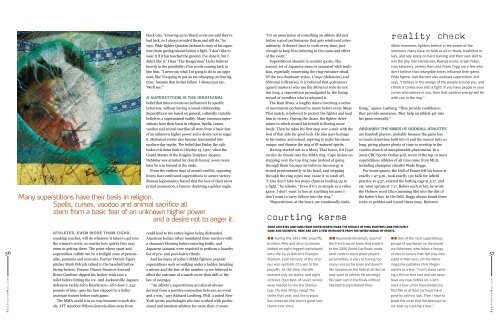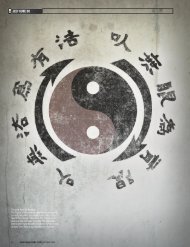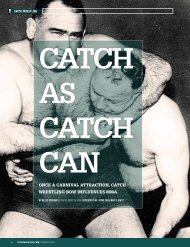Voodoo Mojo Juju Magic - Kelly Crigger
Voodoo Mojo Juju Magic - Kelly Crigger
Voodoo Mojo Juju Magic - Kelly Crigger
You also want an ePaper? Increase the reach of your titles
YUMPU automatically turns print PDFs into web optimized ePapers that Google loves.
lack cats. “Growing up in Brazil, everyone said they’re<br />
bad luck, so I always avoided them and still do,” he<br />
says. Pride fighter Quinton Jackson is wary of his signature<br />
chain getting tainted before a fight. “I don’t like to<br />
wear it if it has touched the ground. I’ve done it, but I<br />
didn’t like it.” Dean “The Boogeyman” Lister believes<br />
heavily in the possibility of his words coming back to<br />
bite him. “I never say what I’m going to do to an opponent,<br />
like ‘I’m going to put an ass whooping on him big<br />
time,’ because that invites failure. I always just say,<br />
‘We’ll see.’”<br />
A SUPERSTITION IS THE IRRATIONAL<br />
belief that future events are influenced by specific<br />
behaviors, without having a causal relationship.<br />
Superstitions are based on general, culturally variable<br />
beliefs in a supernatural reality. Many common superstitions<br />
have their basis in religion. Spells, curses,<br />
voodoo and animal sacrifice all stem from a basic fear<br />
of an unknown higher power and a desire not to anger<br />
it. Historical events also become transmuted into<br />
modern-day myths. The belief that Friday the 13th<br />
bodes evil dates back to October 13, 1307, when the<br />
Grand Master of the Knights Templars Jacques<br />
DeMolay was arrested for church heresy; seven years<br />
later he was burned at the stake.<br />
From the earliest days of armed conflict, opposing<br />
forces have embraced superstitions to secure victory.<br />
Roman legionnaires feared that the loss of their most<br />
prized possession, a banner depicting a golden eagle,<br />
Many superstitions have their basis in religion.<br />
Spells, curses, voodoo and animal sacrifice all<br />
stem from a basic fear of an unknown higher power<br />
and a desire not to anger it.<br />
courting karma<br />
reality check<br />
While numerous fighters believe in the power of the<br />
unknown, many have no faith at all in rituals, traditions or<br />
luck, and rely solely on hard training and their own skill to<br />
win the day. Dan Henderson, Rashad Evans, Urijah Faber,<br />
Ivan Salaverry, Jeremy Horn and Frank Trigg are a few who<br />
don’t believe that intangible forces influence their game.<br />
Pride fighter Josh Barnett also eschews superstition, but<br />
says, “I believe in the energy of the people around you, and<br />
I think it carries over into a fight. If you have people in your<br />
corner who believe in you, then that positive energy will be<br />
with you in the ring.”<br />
“It’s an association of something an athlete did just<br />
before a good performance that gets reinforced intermittently.<br />
It doesn’t have to work every time, just<br />
enough to keep him believing in the cause and effect<br />
of the event.”<br />
Superstitions abound in combat sports. The<br />
ancient art of Japanese sumo is saturated with tradition,<br />
especially concerning the ring-entrance ritual.<br />
Of the two dominant styles, Unryu (defensive) and<br />
Shiranui (offensive), it is believed that yokozunas<br />
(grand masters) who use the Shiranui style do not<br />
last long, a superstition promulgated by the losing<br />
record of wrestlers who’ve adopted it.<br />
The Ram Muay, a lengthy dance involving a series<br />
of movements performed to music before every Muay<br />
Thai match, is believed to protect the fighter and lead<br />
him to victory. During the dance, the fighter determines<br />
in which nostril his breath is flowing more<br />
freely. Then he takes his first step over a stair with the<br />
foot of that side for good luck. He also pays homage<br />
to his trainer and school, aspiring to make his dance<br />
unique and cleanse the ring of ill-natured spirits.<br />
Having started out as a Muay Thai boxer, Kit Cope<br />
carries its rituals into the MMA ring. Cope insists on<br />
stepping over the top ring rope instead of going<br />
through them because he believes his energy is<br />
stored predominantly in his head, and stepping<br />
through the ring ropes may cause it to wash off.<br />
“I also don’t take too many chances leading up to<br />
a fight,” he admits. “Even if it’s as simple as a video<br />
game, I don’t want to lose at anything because I<br />
don’t want to carry failure into the ring.”<br />
“Superstitions, at the heart, are emotionally stabilizing,”<br />
agrees Lustberg. “They provide confidence;<br />
they provide assurance. They help an athlete get into<br />
his game mentally.”<br />
ARGUABLY THE KINGS OF ODDBALL ATHLETES<br />
are baseball players, probably because the game has<br />
so much downtime built into it and the season lasts so<br />
long, giving players plenty of time to worship in the<br />
voodoo church of unexplainable phenomena. In a<br />
2005 CBC Sports Online poll, seven of the top 10 most<br />
superstitious athletes of all time came from MLB,<br />
including champion ritualist Wade Boggs.<br />
For home games, the Hall of Famer left his house at<br />
exactly 1:47 p.m., took exactly 150 balls for infield<br />
practice at 4:37, entered the batting cage at 5:17, and<br />
ran wind sprints at 7:17. Before each at bat, he wrote<br />
the Hebrew word Chai (meaning life) into the dirt of<br />
the batter’s box. In the field, Boggs always found three<br />
rocks or pebbles and tossed them away. Between<br />
56<br />
R E A L F I G H T E R M A G . C O M<br />
ATHLETES, EVEN MORE THAN CIGARsmoking<br />
coaches, will do whatever it takes to get into<br />
the winner’s circle, no matter how quirky they may<br />
seem in getting there. The point where sport and<br />
superstition collide can be a twilight zone of personality,<br />
paranoia and neurosis. Former Detroit Tigers<br />
pitcher Mark Fidrych talked to the baseball before<br />
facing batters. Former Ottawa Senators forward<br />
Bruce Gardiner dipped his hockey stick into a<br />
toilet before hitting the ice. And Jacksonville Jaguars<br />
defensive tackle John Henderson—all 6-foot-7, 325<br />
pounds of him—gets his face slapped by a ballsy<br />
assistant trainer before each game.<br />
The MMA world is in no way immune to such rituals.<br />
ATT standout Wilson Gouveia shies away from<br />
could lead to the entire legion being disbanded.<br />
American Indian tribes inundated their warriors with<br />
a shaman’s blessing before entering battle, and<br />
Japanese samurai were required to perform a laundry<br />
list of pre- and post-battle rituals.<br />
And for many of today’s MMA fighters, popular<br />
superstitions such as walking under a ladder, breaking<br />
a mirror and the fear of the number 13 are believed to<br />
affect the outcome of a match more than skill or the<br />
law of averages.<br />
“An athlete’s superstitions are almost always<br />
derived from a positive connection between an event<br />
and a win,” says Richard Lustberg, PhD, a noted New<br />
York sports psychologist who has worked with professional<br />
and amateur athletes for more than 17 years.<br />
SOME ATHLETES AND FANS FROM OTHER SPORTS MAKE THE RITUALS OF MMA FIGHTERS LOOK POSITIVELY<br />
SANE AND SCIENTIFIC. HERE ARE JUST A FEW HIGHLIGHTS FROM THE WEIRD WORLD OF SPORTS.<br />
During the 1952 NHL playoffs,<br />
brothers Pete and Jerry Cusimano<br />
lobbed an eight-legged cephalopod<br />
onto the ice at Detroit’s Olympia<br />
Stadium. Each tentacle of the octopus<br />
was symbolic of a win in the<br />
playoffs. At the time, the NHL<br />
boasted only six teams, and eight<br />
victories (two best-of-seven series)<br />
were needed to win the Stanley<br />
Cup. The Red Wings swept the<br />
series that year, and the octopus<br />
has remained the team’s good-luck<br />
charm ever since.<br />
Raymond Domenech, coach of<br />
the French soccer team that made it<br />
to the 2006 World Cup finals, reads<br />
tarot cards to learn about players’<br />
personalities, is wary of having too<br />
many Leos on his team and doesn’t<br />
like Scorpios on the field at all. But he<br />
may want to rethink his astrology:<br />
His team lost in the finals without<br />
talented Scorpio Robert Pires.<br />
One of the most superstitious<br />
groups of sportsmen on the planet<br />
are fishermen, who follow a liturgy<br />
of rites to ensure that fish stay interested<br />
in their lures. On the Water<br />
magazine publisher Chris Megan<br />
admits to a few. “I can’t stand catching<br />
a fish on first cast and can never<br />
have any new clothes on. I can’t<br />
crack a beer until I have landed my<br />
first fish or at least six hours have<br />
gone by with no luck. Then I have to<br />
break the curse that has been put on<br />
our boat by cracking a beer.”<br />
57<br />
R E A L F I G H T E R M A G . C O M







